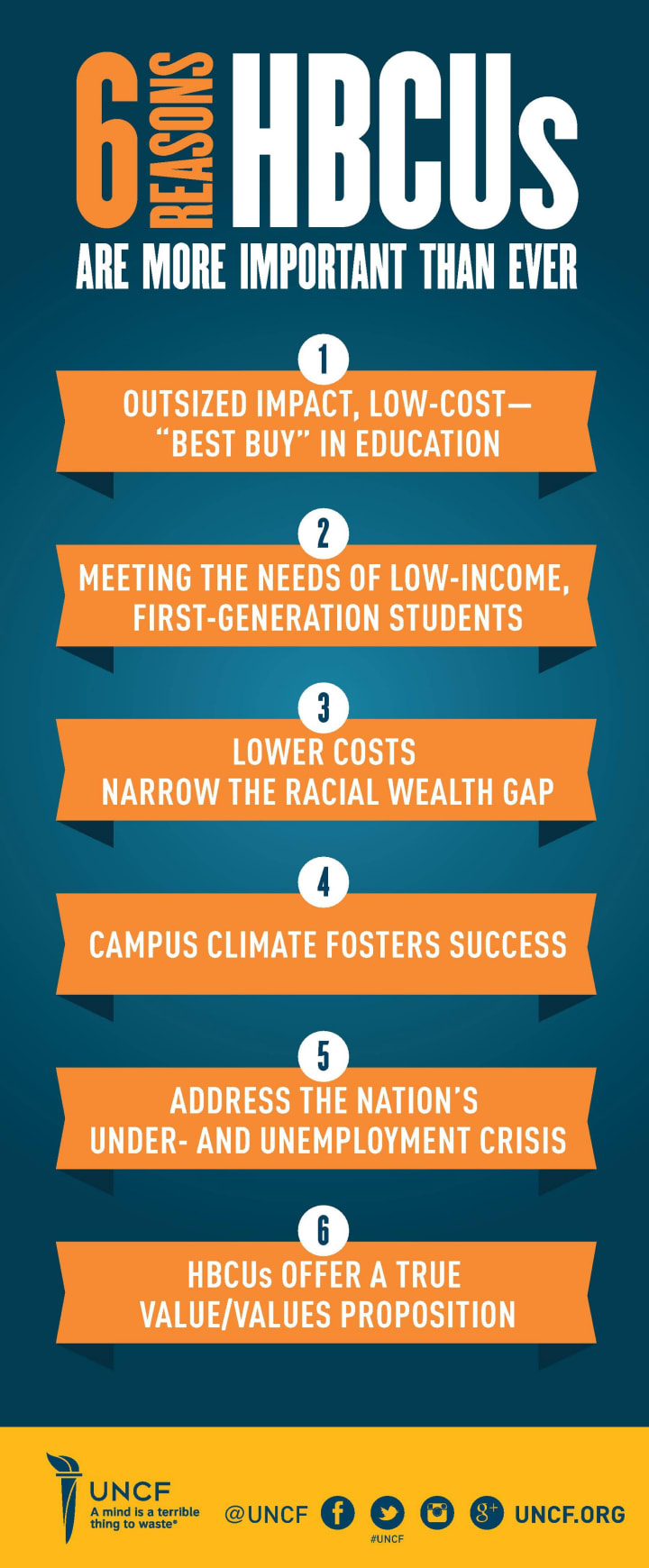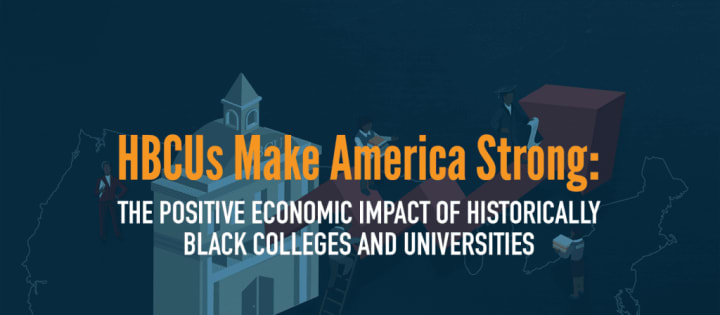Why Colleges of Cultural Significance Are Essential to Our Global Society
A Synergy on HBCUs

For over a period of about 100 years, Historically Black Colleges (HBCU’s) have not only educated minorities that suffer having a voice in today’s global society, but has given them economic opportunities as well as impressionable values and merits to instill in their daily lives. Faith, community, service, physical, mental, and especially emotional support are just a few variables you can acquire at an HBCU. HBCU’s were not manifested as a means to take from any other institution like ‘debates’ forewarn, but to serve as a foundation for the more than 70% student population qualifying for Federal Pell Grants and 80% receiving Federal Loans (Lomax). These individuals are predominately African American due to an array of evident hardships. Together, The United States of America can make an impact if we focus more on what is relevant—science, technology, engineering, and mathematics, which are the more critical industries and factors of our future. Yet, it is imperative that regardless of ethnic background, we continue to recognize the issues that perpetrate a plummet in our education system(s) that will inevitably impact the future to come of any country.
Today, the nation’s 106 HBCUs make up just a shy 3% of America’s colleges and universities, yet they produce almost 20% of all African American graduates with 25% acquiring STEM field oriented degrees. On the forefront, “STEM” is the acronym of science, technology, engineering, and mathematics. However, when you pull away this layer you will come to find most educators know what STEM stands for but not quite what it means considerably dissected. According to The National Science Teachers Association, a common definition would depict STEM education as “an interdisciplinary approach to learning where rigorous academic concepts are coupled with real-world lessons as students apply science, technology, engineering, and mathematics in contexts that make connections between school, community, work, and the global enterprise enabling the development of STEM literacy and with it the ability to compete in the new economy” (Gerlach). Though, whether it be science and mathematics teachers, the construction industry, aerospace industry, or even researchers the principle still stands: we must move forward, solve international issues, educate, and empower, while also pushing innovation to the next level diversely.
Research attained from the National Center for Public Policy and Higher Education, on behalf of the North Carolina Institute of Minority Economic Development, has deemed a college education less affordable for middle and low income families. Statistics exemplify low income households spend 61% of their income on college costs and 189% on private college costs, while middle income households spend 20% of their income on public college costs with 48% contributing to private college costs if desired. The interpretation of such data in other words, identifies the importance of HBCU’s due to North Carolina’s very low need-based financial aid compared to top-performing states. High income households on the flip side spend 8% of their income on public college costs and 18% on private college costs, which emphasizes the unfavorable stigma those who fall under as a “minority” face as a wide population of students (THE NEED). Britannica interprets a minority as the individual(s) whom are “culturally, ethnically, or racially distinct” of a group that coexists, but are otherwise lower in rank than a more dominant group (The Editors of Encyclopedia Britannica). HBCU’s and other colleges that give considerable attention to minorities like The University of North Carolina at Pembroke that advocates Native Americans, provides the lesser with more opportunistic advantages to say the ‘least’.
Throughout our history several heroes and leaders emerged from HBCUs. From the renowned kindness of parishioners at the Emanuel Methodist Episcopal Church in Charleston who perished after opening their doors to a complete stranger, or the inspired, nonviolent leadership of Dr. Martin Luther King, JR., HBCUs produce the very best kind of values-based leadership (Lomax). We not only must protect the cultural integrity, grace, and empathy Historically Black Colleges bestow, but carry on the legacy for the next generation to have access to. There should be equal opportunity for all walks of life, because we are all God’s children. You do not have to be religious, but you should believe in the spirit of love, and love is creating an environment everyone feels accepted. We should aspire to inspire universally, the indispensable prevalence of Historically Black Colleges, and Universities alike in their equitable cultural pursuits.
Works Cited
Gerlach, Jonathan. STEM: Defying a Simple Definition. NSTA, 2019. https://www.nsta.org/publications/news/story.aspx?id=59305
Lomax, Michael. 6 Reasons HBCUs Are More Important Than Ever. UNCF, 2019. https://www.uncf.org/the-latest/6-reasons-hbcus-are-more-important-than-ever
NCLBCF. THE NEED. North Carolina Legislative Black Caucus Foundation, 2013-2022.
https://nclbcf.org/the-need
The Editors of Encyclopedia Britannica. Minority SOCIOLOGY. Encyclopedia Britannica, Inc., 2019.
https://www.britannica.com/topic/minority
Taking the First Step!

"Donald Trump Signing Executive Order for the Priority of HBCUs"
U.S. President Donald Trump welcomed several leaders of historically black colleges and universities (HBCU) in the Oval Office on February 27, 2017 at the White House. Though this is an impressionable first step, the necessity of continuing to further fund these schools and establish a more equitable viewpoint is crucial.
Recognizing the "Need"

"Dr. Michael Lomax's 6 Reasons HBCUs Are More Important Than Ever"
A question that has caused much debate is "do we still need black colleges?" The answer would serve the same as any other historical and/or cultural comprised college—a resounding "yes!" As the CEO of the United Negro College Fund (UNCF), also known as the nation's largest and most effective educational organization, in the photograph above Dr. Michael Lomax highlights thought-provoking reasons HBCUs should be here to stay. Wages have not only become consistently stagnant in some cases, but the ratio of college tuition prices serving on the basis of whom has the money to spare, has become an economical issue. As a result, more students specifically those considered "minorities" from a social status standpoint, have thus experienced college debt.
According to The Editors of Encyclopedia Britannica, a minority can be defined as any "culturally, ethnically, or racially distinct group that coexists with but is subordinate to a more dominant group. As the term is used in the social sciences, this subordinacy is the chief defining characteristic of a minority group. As such, minority status does not necessarily correlate to population. In some cases one or more so-called minority groups may have a population many times the size of the dominating group, as was the case in South Africa under apartheid (c. 1950–91)." This supports the vital impression this leaves. Funding towards HBCUs is more necessary than ever to continue helping those that suffer in silence trying to obtain an education. There is a myriad of hardship factors that can hinder an individual seeking to obtain a college degree given not only cost, but investment. No wonder so many students drop out due to depression. We have to give those suffering in silence a voice! Dr. Michael Lomax's United Negro College Fund has made efforts that has transpired 450,000 students to college graduates, through funding of $4.8 billion and $11 million accredited to students in New York, Atlanta, Chicago, Philadelphia, as well as Washington, DC in the means of Scholarships. 70% is the graduation rate for UNCF scholarship recipients is 9% points higher than the national average for all students at four-year colleges (UNCF). If this does not make you want to make a difference, I do not know what will! Let's all come together for what matters, as our 1st amendment of our Constitution adheres to—"Congress shall make no law respecting an establishment of religion, or prohibiting the free exercise thereof; or abridging the freedom of speech, or of the press; or the right of the people peaceably to assemble, and to petition the government for a redress of grievances."
UNCF. Our Impact. United Negro College Fund, Inc. UNCF, 2019. https://www.uncf.org/our-impact.
The Editors of Encyclopedia Britannica. Minority SOCIOLOGY. Encyclopedia Britannica, Inc., 2019.
The Conclusion

"HBCUs Add Positive Attributes!"
In conclusion, the figment of HBCUs should not be seen in a negative light but a positive one. It is quite disheartening, especially being an African American woman, to see the debate of a college meant to serve as a means of support be questioned or even bashed rather. HBCUs not only provide emotional support, but financial support as well that any of us could face.
I do not want to see anymore "Make America White Again" debates. How about make America equal and equitable again? Continue with debates of purpose, not debates that chastise the actual issue. HBCUs, just like The University of North Carolina at Pembroke serve as a distinctive way to promote diverse acceptance. Change starts with us! We have to be more understanding and less critical. I hope this article promotes inspiration as I intend, and not hate.With all of my kind regards and aspirations.
About the Creator
Alaysjahe Sims
An individual with a knack for creating impactful insights, manifesting thought-provoking ideas, and adapting proactively to change are some of my impressionable values. I love to be a creative pioneer with a desire for change in the World!






Comments
There are no comments for this story
Be the first to respond and start the conversation.